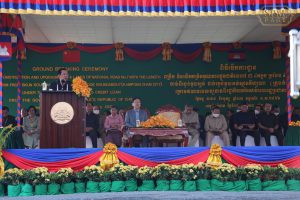Cambodia’s Prime Minister Hun Sen has warned his few remaining political opponents not to accuse his party of electoral fraud at the upcoming national elections, saying that those who do could face legal action or violent attacks.
Speaking at the groundbreaking of a national highway refurbishment project in Kampong Cham on Monday, Hun Sen, who will finish his 38th year in power this weekend, said that he had no more tolerance for those accusing his Cambodian People’s Party (CPP) of enjoying an unfair electoral advantage.
“There are only two options: one is using legal action, the other is using sticks… What do you want?” he said, according to Agence France-Presse. “Either you face legal action in court or I rally CPP people for a demonstration and beat you guys up.”
According to AFP’s report, the Cambodian leader also instructed his lawyers to monitor speeches by opposition politicians. “We won’t let you accuse us of being thieves all the time,” he added. “The CPP cannot accept being called thieves who steal votes. We must sue whoever says that.”
Hun Sen’s comments suggest that the freedom of the elections due in July, like those of 2018, are likely to be tightly circumscribed. Indeed, the CPP, which has been in power since the overthrow of the Khmer Rouge government in 1979, is set for an almost certain victory, given the dearth of meaningful opposition and its control of virtually all of the organs of the state.
Prior to the 2018 election, the Cambodian government outlawed the country’s largest opposition party, the Cambodia National Rescue Party (CNRP), arrested its leader Kem Sokha for treason, and drove most of its senior leadership into exile. The CPP went on to win all 125 seats in the National Assembly, marking a symbolic end to the process of democratization initiated by the United Nations during an international peacekeeping mission in 1992-93.
While the chance of an upset is low, things are unlikely to be quite so one-sided this year. An opposition party known as the Candlelight Party (CLP) was permitted to take part in last year’s commune election and won 18 percent of the vote. An avatar of the opposition party founded by exiled politician Sam Rainsy in 1995, the CLP emerged from dormancy in late 2021 and the authorities subsequently allowed it to register, in part to encourage a split between Sam Rainsy and Kem Sokha, whose two parties merged to form the CNRP in 2012 and went on to score significant gains at the national election held the following year.
Even then, Hun Sen’s administration has moved to ensure that the CLP does not move beyond its purely ornamental political role. In October, the party’s deputy leader Son Chhay, a long-time ally of Sam Rainsy who also holds Australian citizenship, was convicted of defamation for criticizing the conduct of the commune elections held last June, ordered to pay $750,000 in compensation to the ruling party.
In an interview shortly after the election, Son Chhay had pointed to the host of disadvantages facing the CLP and other opposition parties, from the obvious pro-CPP bias of the country’s National Election Committee to the widespread intimidation and vote-buying that aided the CPP’s victory. Local officials have also been subject to a range of threats and intimidation by local government and CPP officials.
In addition, Hun Sen used Monday’s speech once again to air a possible ban on senior government officials, including the prime minister, from holding dual citizenship – a transparent move to limit the opposition further, given that many senior opposition members hold Australian, U.S., or French citizenship.
Political crackdowns, both in the streets and in the courts, have long been a feature of the months leading up to Cambodian elections. But the fact that Hun Sen still feels the need to issue such threats, even from a position of such dominance, speaks to a certain sense of paranoia, and perhaps also a need to preserve political stability in anticipation of the sensitive handover of power to his eldest son, Hun Manet. Even with the electoral field slanted sharply in his favor, Hun Sen continues to guard the political space against the emergence of any meaningful political alternative.

































